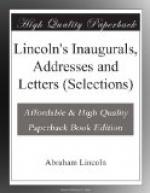During the summer of 1858 Lincoln delivered two important anti-slavery speeches at Springfield. The first and more important of these was made June 16,[*] at the close of the Republican State Convention, at which Lincoln was declared the party candidate for the United States Senate. The second, delivered a month later, is in part a defence and explanation of the earlier speech, which had been severely criticised by Lincoln’s old opponent Judge Douglas. The first Springfield speech was very carefully prepared and the MS. was submitted to several of Lincoln’s friends, all of whom objected to the opening statement as being impolitic and sure to lose the speaker the position for which he was a candidate. Lincoln refused to make any change, however, saying that he preferred to go down linked with truth, if that was necessary.
[*]By Herndon the date is given as June 17.
“A house divided against itself.” Suggested by Matthew xii. 25, and Mark iii. 25. This quotation had already been used in 1843 in a Whig circular signed by Lincoln and two others, and in a letter written in 1863 Lincoln speaks of the government as a house divided against itself.
Nebraska doctrine. The doctrine of “squatter sovereignty” was recognized in the bill, introduced in the Senate January 4, 1854, by Douglas, to give territorial government to the district west of Missouri and Iowa known as Nebraska. A similar bill had been introduced the year before by Douglas. In its original form the bill contained no reference to the repeal of the Missouri Compromise, but in the form in which it was passed it declared the Missouri Compromise to be null and void. Under the terms of this compromise slavery had been restricted to the territory south of 36 degrees 30 minutes.
Dred Scott decision. This decision was rendered March 6, 1857.
Silliman letter. A statement on the situation in Kansas by the electors of Connecticut, which received its name from Professor Silliman of Yale College, by whom it was in the main drawn up.
Lecompton Constitution. In 1857 a convention was held at Lecompton, Kan., to draw up a state constitution. In this convention the advocates of slavery were in the majority and the instrument was so prepared as not to interfere with slavery wherever it already existed in the territory. The free-soil advocates refused to accept this constitution. When the question of admitting Kansas under the Lecompton Constitution was presented before Congress, Douglas, in accordance with his principles of popular sovereignty, broke with his party and opposed the effort. From our present point of view Lincoln does not seem to do Douglas justice.
Stephen, Franklin, etc. The reference is to Stephen A. Douglas, President Franklin Pierce, Chief Justice Roger B. Taney, and James Buchanan. Lincoln’s perfectly sincere belief in a deliberate conspiracy among these men to perpetuate slavery, which was shared by many Republicans of that time, is not sustained by the impartial investigations of later historians.




